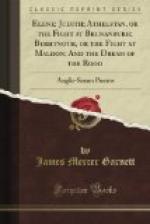It has been usually thought that the Old English poet
used this Life as his source; but Gloede, in a recent
volume of Anglia (ix. 271 ff.), has given
reasons for thinking that the poet used some other
Latin text. He rejects ten Brink’s conjecture
that the legend of Elene had come to England in a
Greek form. As to the author of the poem, we
know his name, but very little else about him.
He has left us his name, imbedded in runic letters
as an acrostic, in the last canto of the poem, q.v.
These letters spell the word Cynewulf; but who
was Cynewulf? The question is hard to answer,
and has given rise to much discussion, which cannot
be gone into here. A good summary of it will be
found in Wuelker’s Grundriss zur Geschichte
der Angelsaechsischen Litteratur (p. 147 ff.,
1885), an indispensable work for students of Old English
literature. The old view, propounded in the infancy
of Anglo-Saxon studies, and held by Kemble, Thorpe,
and, doubtfully, Wright, that he was the Abbot of
Peterborough and Bishop of Winchester (992-1008),
has been abandoned by all scholars, so far as I know,
except Professor Earle of Oxford (see his “Anglo-Saxon
Literature,” p. 228). The later view of
Leo, Dietrich, Grein and Rieger, our chief authorities,
that he was a Northumbrian, and of Dietrich and Grein,
that he was Bishop of Lindisfarne (737-780), has more
to be said for it. Sweet and ten Brink also hold
that he was a Northumbrian of the eighth century,
but not the Bishop of Lindisfarne, while Wuelker regards
him as a West-Saxon. Professor Henry Morley,
in the current edition of his “English Writers,”
has devoted a chapter (Vol. II. Chap.
IX., 1888) to Cynewulf, and virtually concludes that
we know nothing about him except that he was a poet
and probably lived in the eighth century. We shall
not go far wrong in regarding him as a Northumbrian
poet of the eighth century, possibly the Bishop of
Lindisfarne, even though his works remain to us only
in the West-Saxon dialect. As in the Elene,
so in the Christ and the Juliana, Cynewulf
has left us his name, hence all agree in ascribing
to him these poems at least. To these some of
the Riddles, if not all, are usually added, but
this is now contested. Other poems, as the GUTHLAC,
Phoenix, CHRIST’S descent into
hell, Andreas, dream of the
rood, and several other shorter poems, have been
ascribed to him with more or less probability, and
very recently Sarrazin (in Anglia, IX. 515
ff.) would credit him with the authorship of even the
BEOWULF(!). We might as well assign to him, as
has been suggested, all the poems in the two great
manuscripts, the Exeter Book and the Vercelli Book,
and be done with it. It is desirable that his
authorship of the DREAM OF THE ROOD, which ten Brink
and Sweet assign to him, but Wuelker rejects, should
be proved or disproved; for with this is connected
the question of his Northumbrian origin, and some
lines from this poem have been inscribed in the Northumbrian
dialect on the Ruthwell Cross in Dumfriesshire.




